
Conyers Middleton was an English clergyman. Though mired in controversy and disputes, he was also considered one of the best stylists in English of his time.

Cambridge University Library is the main research library of the University of Cambridge. It is the largest of over 100 libraries within the university. The library is a major scholarly resource for members of the University of Cambridge and external researchers. It is often referred to within the university as the UL. Thirty-three faculty and departmental libraries are associated with the University Library for the purpose of central governance and administration, forming "Cambridge University Libraries".

Richard Farmer FRS FSA (1735–1797) was a Shakespearean scholar and Master of Emmanuel College, Cambridge. He is known for his Essay on the Learning of Shakespeare (1767), in which he maintained that Shakespeare's knowledge of the classics was through translations, the errors of which he reproduced.

Legh Richmond (1772–1827) was a Church of England clergyman and writer. He is noted for tracts, narratives of conversion that innovated in the relation of stories of the poor and female subjects, and which were subsequently much imitated. He was also known for an influential collection of letters to his children, powerfully stating an evangelical attitude to childhood of the period, and by misprision sometimes taken as models for parental conversation and family life, for example by novelists, against Richmond's practice.
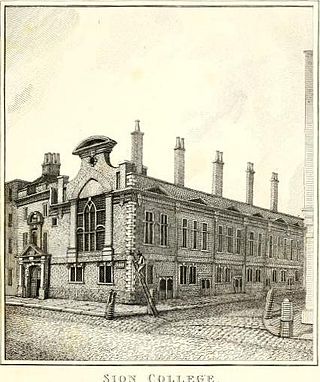
Sion College, in London, is an institution founded by royal charter in 1630 as a college, guild of parochial clergy and almshouse, under the 1623 will of Thomas White, vicar of St Dunstan's in the West.
The Master Mercers of the Worshipful Company of Mercers have been, by reign:
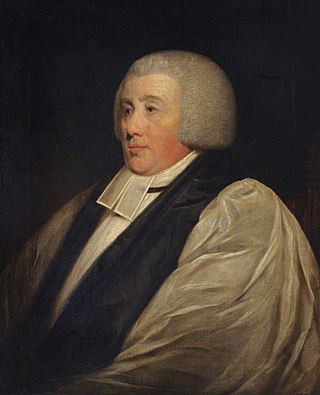
William Lort Mansel was an English churchman and Cambridge fellow. He was Master of Trinity College, Cambridge from 1798 to his death in 1820, and also Bishop of Bristol from 1808 to 1820.
Father Richard Holtby was an English Jesuit superior and Roman Catholic priest.
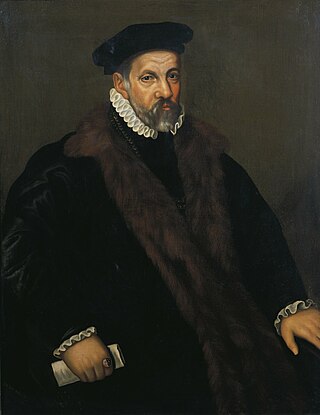
Thomas Wilson (1524–1581), Esquire, LL.D., was an English diplomat and judge who served as a privy councillor and Secretary of State (1577–81) to Queen Elizabeth I. He is remembered especially for his Logique (1551) and The Arte of Rhetorique (1553), which have been called "the first complete works on logic and rhetoric in English".

The Church of St Andrew, Holborn, is a Church of England church on the northwestern edge of the City of London, on Holborn within the Ward of Farringdon Without.
John Bridges (1536–1618) was an English bishop.
The High Sheriff of Carlow was the British Crown's judicial representative in County Carlow, Ireland from the 14th century until 1922, when the office was abolished in the new Free State and replaced by the office of Carlow County Sheriff. The sheriff had judicial, electoral, ceremonial and administrative functions and executed High Court Writs. In 1908, an Order in Council made the Lord-Lieutenant the Sovereign's prime representative in a county and reduced the High Sheriff's precedence. However, the sheriff retained his responsibilities for the preservation of law and order in the county. The usual procedure for appointing the sheriff from 1660 onwards was that three persons were nominated at the beginning of each year from the county and the Lord Lieutenant then appointed his choice as High Sheriff for the remainder of the year. Often the other nominees were appointed as under-sheriffs. Sometimes a sheriff did not fulfil his entire term through death or other event and another sheriff was then appointed for the remainder of the year. The dates given hereunder are the dates of appointment. All addresses are in County Carlow unless stated otherwise.

William Cooke (1711–1797) was an English cleric and academic, Provost of King's College, Cambridge from 1772 and Dean of Ely from 1780.
John Bonfoy Rooper was a British Member of Parliament.
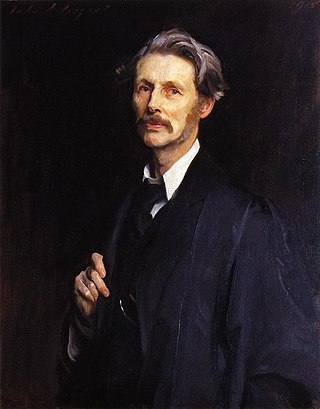
Francis John Henry Jenkinson was librarian of the University of Cambridge 1889–1923. He was succeeded by A. F. Scholfield.
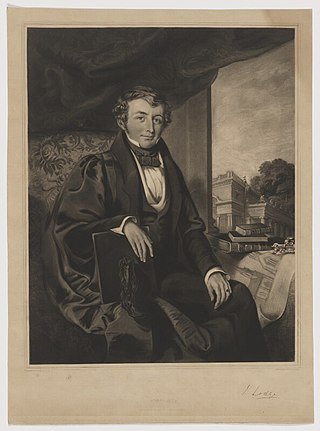
John Lodge was the librarian (bibliothecarius) of the University of Cambridge from 1828 to 1845.

John Barnardiston was an English clergyman and librarian. Born in London c. 1719, he was the son of George Barnardiston, a lawyer who was a member of the Middle Temple. Growing up, Barnardiston studied at Tonbridge School, which awarded him an exhibition to study at Corpus Christi College, Cambridge as a sizar in 1737. He studied at the University of Cambridge for seven years, being awarded a Bachelor of Arts in 1741 and a Master of Arts in 1744. In the next year, Barnardiston became a fellow of Corpus Christi College and continued to hold that position until 1759.
Theodore Henry Broadhead was an English army officer and politician.











